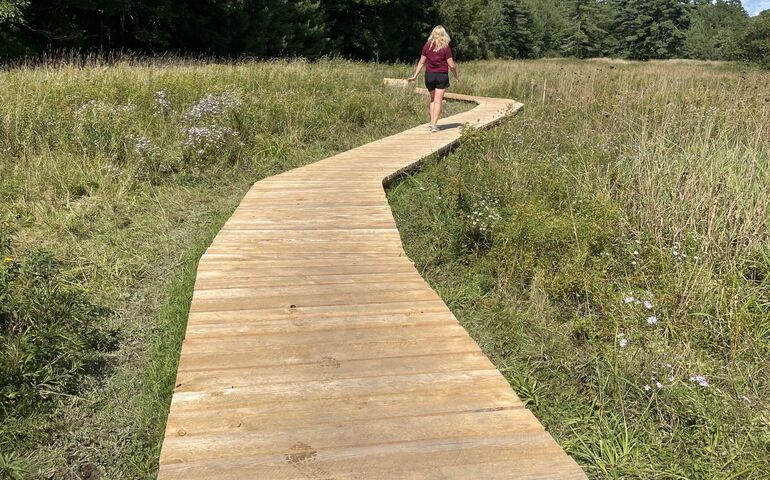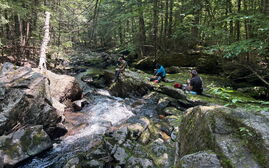$30M trail bond gets bipartisan approval from Maine Legislature
 Courtesy / Scarborough Land Trust
In recent years, the Scarborough Land Trust built and rerouted a 600-foot boardwalk on one of its trails at Fuller Farm Preserve, so that it would avoid cutting through bobolink nesting habitat.
Courtesy / Scarborough Land Trust
In recent years, the Scarborough Land Trust built and rerouted a 600-foot boardwalk on one of its trails at Fuller Farm Preserve, so that it would avoid cutting through bobolink nesting habitat.
The Maine Legislature on Tuesday approved a proposed bond that would provide $30 million over four years to invest in the design, development and maintenance of recreational trails around the state.
In a strong show of bipartisan support, the House voted 133-6, and the Senate voted 29-3.
If signed by Gov. Janet Mills, the Maine Trails Bond bill (LD 1156) will appear on the November statewide ballot for approval by voters.
The bond received endorsement from more than 520 public supporters, including 75 Maine cities and towns, 168 businesses, 41 ATV and snowmobile clubs, 43 statewide organizations and 193 local organizations.
Among the backers are the Maine State Chamber of Commerce, L.L.Bean Inc., Maine Municipal Association, Maine Snowmobile Association, ATV Maine, Bicycle Coalition of Maine, New England Mountain Bike Association, Maine Tourism Association and Maine Outdoor Brands.
The ballot referendum would be the first time that Maine voters will have an opportunity to vote for a trails bond, according to a news release.
The bond was introduced by state Rep. Jessica Fay, D-Raymond, and Sen. Russell Black, R-Franklin County, with cosponsor support from three Democrats, four Republicans and one Independent.
Local impact
If passed by voters, the bond would provide $30 million in competitive grants over four years to organizations and towns for motorized, non-motorized and multi-use trail projects. Funds would be managed by the Bureau of Parks and Lands for the design, maintenance and construction of trails statewide.
According to Deb Bowker, recreation director for the town of Carrabassett Valley, the area has seen “explosive growth” in trail use over the past decade.
Enock Glidden, an outdoor accessibility specialist, said the money would help provide new accessible opportunities.
“In rural Maine, trails are critical to our way of life and our economic future,” said Angela Arno, executive director of the Piscataquis County Economic Development Council.
The money would help towns like Skowhegan that have been “doubling down” on outdoor recreation as a critical part of their economic future, said Kristina Cannon, executive director of Maine Street Skowhegan.
Jenny Kordick, executive director of Maine Outdoor Brands, said the bond would strengthen Maine’s “outdoor brand” and outdoor industry.
“Investments in trails are an investment in our entire state, helping make Maine a desirable place to live, work, visit and do business,” Kordick said.
George O’Keefe Jr., economic development director for the town of Rumford, noted that the bond fits with the town’s economic diversification strategy, key to which has been promoting and enhancing outdoor recreation. The money could “potentially assist our town in building trails in the 450-acre Rumford Community Forest,” he added.
The bond’s advancement comes as stakeholders in Maine’s $3 billion outdoor recreation economy are reviewing damages to trails and access roads as a result of frequent rain and extreme storms since December.
Preliminary estimates to repair trails and trail infrastructure — from major washouts, erosion, shifted or missing structures and tree blowdowns — total over $5.2 million, but the number will expected to be more. Questions to be considered include, whether to build back trails, reroute them or close them entirely.
Big industry
Outdoor recreation makes up 3.6% of Maine’s economy, making Maine one of the top five states in the country in the value outdoor recreation adds to statewide gross domestic product, as measured by the Bureau of Economic Analysis Outdoor Recreation Satellite Account in its 2021 report, according to Carolann Ouellette, director of the Department of Economic and Community Development’s Office of Outdoor Recreation.
Outdoor recreation supports more than 30,000 jobs in Maine, accounting for 4.9% of employment and providing more than $1.2 billion in compensation, accounting for 2.8% of the state's wages. Employment has grown 15.6% in Maine compared to an increase of 13.1% for the U.S.
“The pandemic highlighted the need for close-to-home recreation, specifically the importance of better access to the outdoors for all as so many discovered the health benefits, both physical and mental, of spending time outside,” Ouellette said.
“This increase in participation by both residents and visitors has put a strain on ecosystems and infrastructure, reminding us of the ongoing challenges of overuse and revealing the need for investment in, and increased access to, trails and open spaces for resident quality of life, deeper visitor experiences, and long-term sustainable economic development.”
Ouellette said that outdoor recreation also fuels employment in other sectors, such as manufacturing, finance, retail, transportation food services, tourism and travel.
Mainebiz web partners
Our failing schools should be given money!













1 Comments